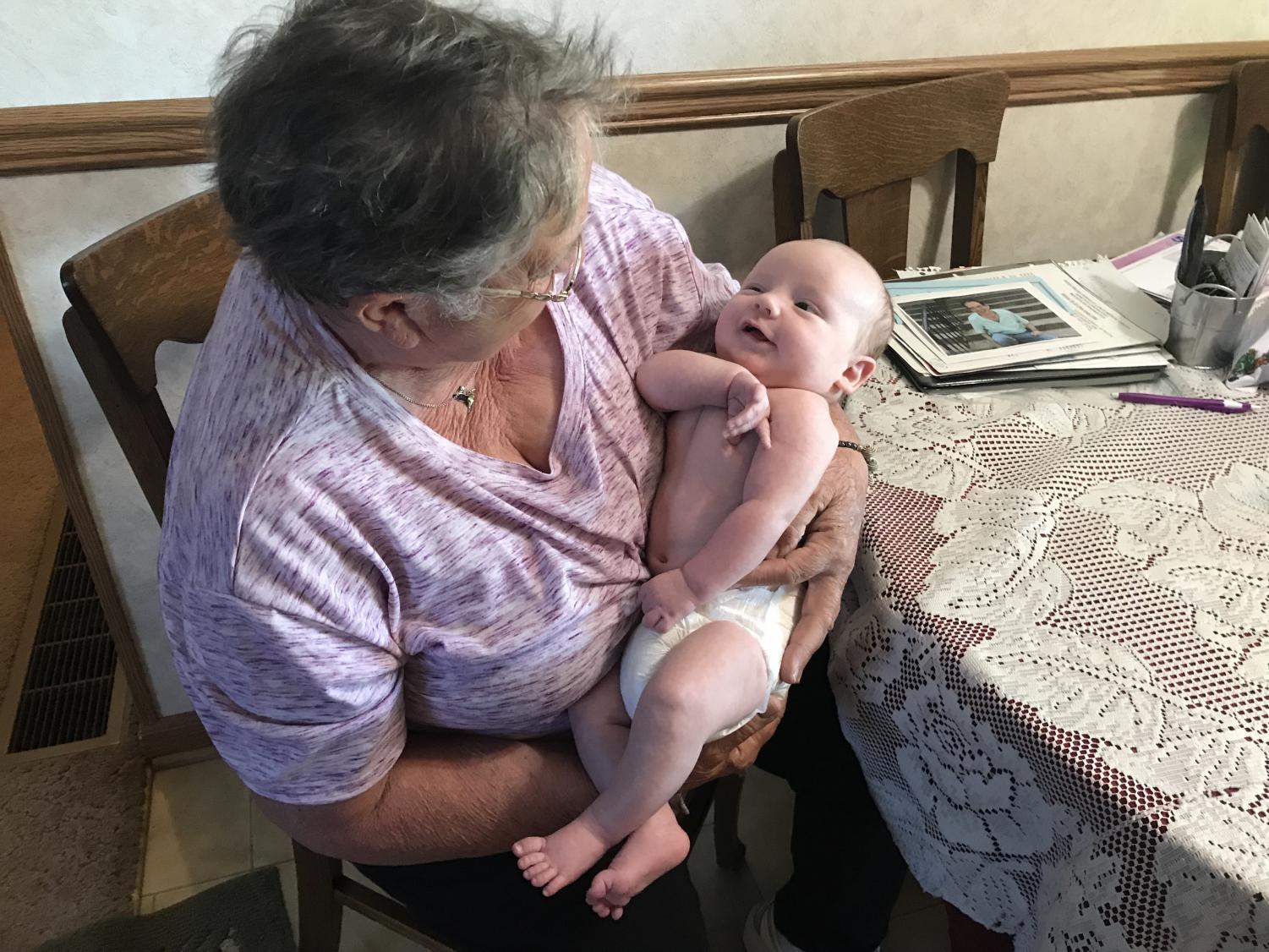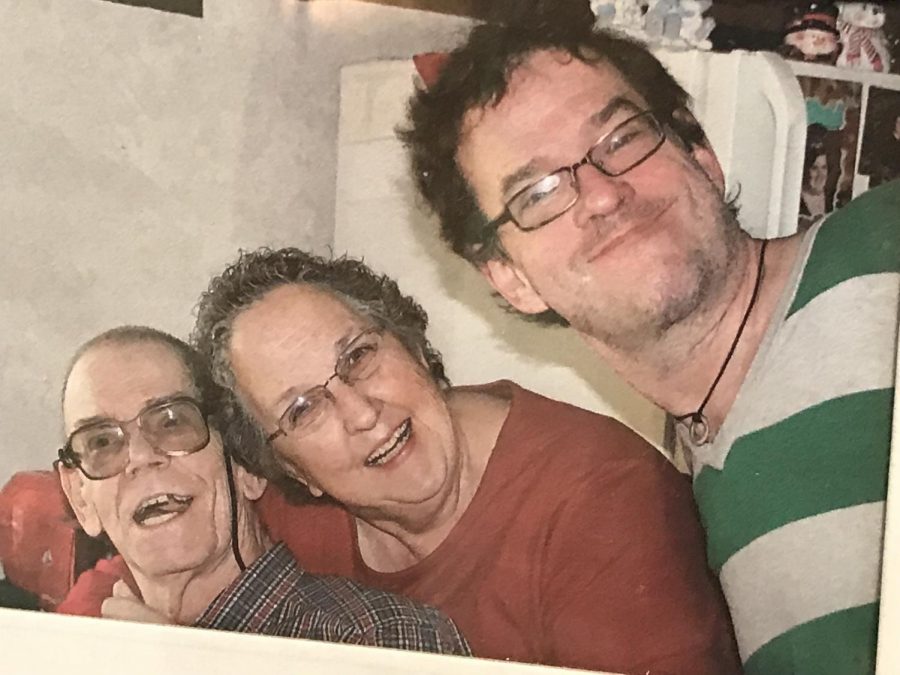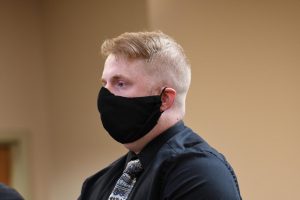Roseville woman relives loss each day to create awareness for Huntington’s disease
Phyllis Shoemaker pictured with her husband, Sherman (left) and son Sherm (right) during their last Christmas together.
May 26, 2018
As 65 walkers arrived at Zane’s Landing Park for the 9th annual Team Hope Walk for Huntington’s disease Saturday morning, children could be seen racing up and down the walking path, screaming and laughing. Others gathered together for pictures with their teams. But inside the registration pavilion was Phyllis Shoemaker, the woman who founded Zanesville’s Team Hope Walk nearly a decade ago.

Teams begin 5K walk for Huntington’s disease at Zane’s Landing Park.
For Shoemaker, the walk is more than a few hours of recognizing Huntington’s disease each year. Instead, it is another way for her to fulfill her mission in raising awareness about the deadly disorder.
When the walk first began, Shoemaker was doing it for her husband and son, who were both living with Huntington’s disease for decades.
Shoemaker’s husband, Sherman, was officially tested and diagnosed with the disease in 1997. Their son, Sherm, was diagnosed in 2003.
It didn’t come as a surprise that someone else in their family would eventually receive the diagnosis. After all, it is hereditary, and Sherman had a string of family member’s before him who also fought the same condition. However, the disease is nothing anyone could really prepare for, even after seeing others go through it.
Huntington’s disease is described by the United States Library on Medicine as a brain disorder that causes the body and brain to lose control of movements, emotion, and cognition.
The disease completely alters a person’s mind and body, as it did for the men in Shoemaker’s life.
Shoemaker watched her husband go from a brilliant mind who once helped develop the computer systems for barcodes and support systems for the Air Force’s F-15 fighter jets, to a grandpa who couldn’t keep up in a card game with his grandchildren.
Shoemaker said her husband had difficulty moving the cards in his hands and setting down the card he’d like to play, which made playing a game of Euchre with Sherman take much longer than normal.

That was no matter for Sherman’s family.
“These grandkids of his were so patient and so loving with their grandpa,” said Shoemaker.
Sherman’s mind was still sharp, though.
“He could beat you. He knew what he was doing,” said Shoemaker. “We never doubted what he was doing, it just took him forever to do it.”
While it took Sherman until his mid-50s to be diagnosed with the disease, his son Sherm was diagnosed in his early 40s with symptoms that progressed much more rapidly.
His mother describes Sherm as a gentle man who was loved by anyone who met him.
“The sun rose and set on him,” said Shoemaker.
However, Huntington’s disease caused Sherm to have uncontrollable manic episodes in which he lashed out on those around him.
Sherm’s episodes were enough to scare his partner of more than 20 years into locking himself in the bedroom “to get away from this peaceful, mild, loving, happy, person,” said Shoemaker.
This symptom of extreme anger was not present in Sherm’s father.
“There were only four of five times that I know of that my husband got really angry and mean,” said Shoemaker. “He could be kind of irritable in real life,” she said laughingly, “and yet our son, who was so mild-mannered, frightened some people.”
Shoemaker can recall the time a close friend of Sherm’s stopped by his apartment to drop off some fresh sweet corn. The friend had heard of Sherm’s episodes, but never believed them to be true. That day was different.
“When she came in, he got really angry with her and really mean and hateful,” Shoemaker said.
Despite what was said, Sherm’s friend viewed it positively.
“She said it was meant to be so she could really see what that disease does,” said Shoemaker.
Not everyone was as understanding of Sherm’s condition, however. According to Shoemaker, Sherm was fired from his job despite his employer knowing he had Huntington’s disease.
“The last three years that our son worked, he wore a medical bracelet that said ‘I’m not intoxicated. Take me to a doctor. I have Huntington’s Disease,’ because when he walked down the street, he looked like he was drunk out of his mind,” said Shoemaker. “That was a result of him not having any muscle control.”
Despite not being able to control himself and his life at times, Sherm kept a positive attitude, even as the disease worsened.
During his last two years, Sherm lived in a nursing home where he was supposed to be the one being taken care of by the staff. However, Sherm put the needs of others before him, especially for one nurse in particular who Sherm sensed was having a hard time. He went out of his way everyday to make her smile.
“He put his time into helping other people, and I also think that’s why he progressed faster. But, to me, that’s a good thing,” Sherm’s mother said. “He had a better life than he would have had sitting feeling sorry for himself.”
On December 24, 2011, Christmas Eve, Sherm died at the age of 49.
A matter of months later in May, his father, Sherman, died at 69. He would have been 70 the following day.
After a year of heartbreak for Shoemaker, she never gave up hope on putting an end to the disease that took her beloved son and husband too soon.
Now Shoemaker participates in the Team Hope Walk in their memory and for her family’s future.

“Someday, mothers are not going to have to watch a child like this die,” Shoemaker said while holding up a picture of her son, Sherm, and choking back tears. “I watched him all those years. I knew he was going to die, and there was nothing I could do. And the same with my husband.”
A lot has changed since the first in her husband’s family developed the disease. Shoemaker said they were once admitted to lunatic asylums because no one knew what caused them to lose control of their bodies and minds.
At the time, no one really talked about the disease.
“There was a stigma with it,” said Shoemaker. “They didn’t talk about it because maybe we were one of those crazy families. It has lots of horrible symptoms, so people didn’t openly talk about it.”
Now, Shoemaker does all she can to educate anyone who’s willing to listen about the disease. She’s presented to several church groups in Muskingum County, the Lions and Kiwanis clubs, and the Zanesville Chamber of Commerce. She also travels to conferences and tells her story in order to raise awareness and eventually find a cure, even if it means living through those tough days again and again.
“You don’t relive it every year. You relive it everyday,” said Shoemaker. “You learn how important life is. You learn how important people are. And you learn how important it is to care for and love the people that you love.”












Linda Goins • May 30, 2018 at 7:58 pm
have huntington also live also in Roseville just stared to take med could use a friend like me linda goins with cap on